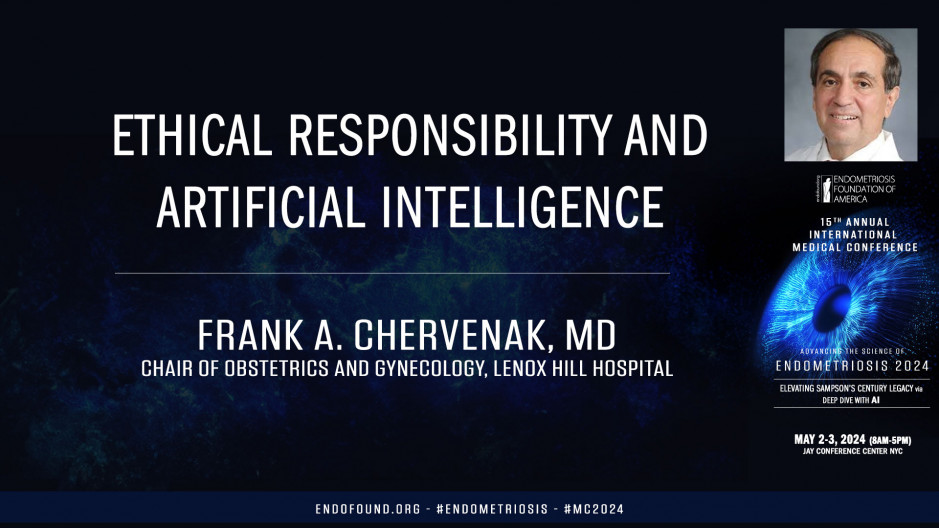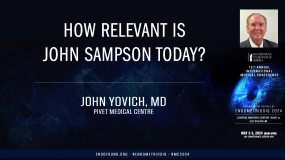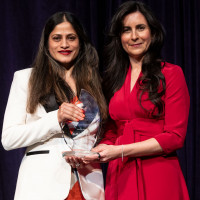International Medical Conference
Endometriosis 2024:
Elevating Sampson’s Century Legacy via
Deep Dive with AI
For the benefit of Endometriosis Foundation of America (EndoFound)
May 2-3, 2024 - JAY CENTER (Paris Room) - NYC
Before we begin, I must say a couple of words. This is a wonderful conference and it's a pleasure and privilege to be with you. The great artist Marcelle Ham said, what is art to make what is invisible, visible? And it's a credit to all of the great artists around this room who are going to speak today and tomorrow, who in their careers have done made endometriosis visible through their work, their ongoing work. And it's a thing of beauty. We have to acknowledge two people. Dan Martin, you have spent many, many, many hours. And I've learned he volunteers this. He does this on his own time and effort, and he's put together a wonderful program of expert. Stan, you've been wonderful.
Thank you, thank you. Thank
You's. Someone who runs programs. This is a master stroke. Thank you. And I can't, I have to say a word about Tamar. As Tamar says, I'm the chair and Tamar is the true professor. He's the full package first. He's the quintessential surgeon. Please. It's very unusual in any department that the surgeons go to OB GYN for help. And that's indeed the case. He is our department's best surgeon, and that's saying a lot, not the oncologist, not the minimally invasive, he's the best surgeon. And as you know, he's renowned throughout the world and outstanding surgeon. Not just that he's a consummate researcher. You all know his work. He's the consummate, translational researcher and he's published extensively and continues with the tireless appetite to doing it. And so importantly, he's the consummate educator, the Sanskrit word of muda. He takes pleasure in bringing other people on, whether it's his protege, Amanda Chu or a resident. He loves to see the younger people grow. So he's the full package. I mean, please, those of you who are in leadership positions, you could only wish everyone was like damir kin. So Tamara, thank you.
Thank you for, thank you again.
Now the program is tight, so I only have a few moments, so if I go quickly, I'm always reachable. But we're going to give a very brief overview of ethical responsibility and artificial intelligence. Now, as we all please, I love the ancient Greeks, but for millennia, our profession was not a profession, it was a guild. It wasn't until two great physician philosophers, John Gregory and Thomas Percival. Finally, we said, wait a minute, the patient comes first. John Gregory was Scottish, and in response to the entrepreneurial aspect of the time, he said, wait a minute, the patient comes first. This was revolutionary and went against the guild interest of his time, his contemporary in London. Thomas Perceval published the first textbook of ethics for the first time, the word beneficence was used whereby we use science. These two great physician philosophers were adapted into America. And indeed our whole A code of ethics is based on the word of Gregory and Perceval.
So Hippocrates is wonderful, but this was the foundation of modern ethics going very quickly. But I love this image from the Royal College. I'm proud to be in the Royal College of Great Britain. And this picture says it all. It's not enough to be a great scientist at the time. On the one side is the quintessential scientist. This is the Chamberlain forceps. These saved mother's lives when a cesarean delivery would've been a death sentence, not enough. It's melded with the compassion and virtues of a midwife. And indeed, that's what we teach today. This is what the ideal obstetrician. The ideal gynecologist is scientific excellence melded with the professional virtues. Now and again, I'm going very quickly, beneficence, respectful, autonomy, justice, compassion, integrity, professional confidence, confidentiality. These transcend our profession. I'm an obstetrician, but they apply to gynecology and endometriosis. Now, the topic today is artificial intelligence.
And indeed, John Sampson would be so proud of this program that timer and Dan Martin have put together because he was into diagnosis and he'd be proud of using the most advanced technology. It's being used today in the field of endometriosis for diagnosis and treatment. Algorithms analyze imaging data such as ultrasounds and MRI to detect signs of endometriosis more accurately and quickly than traditional methods. They can help to predict disease progression in response to treatments by analyzing patterns in medical records, in patient data. Now as with anything, their ethical concerns, privacy and data security, risk of bias, AI algorithms, we're going to have more to say about this in transparency and accountability are critical. Now, I'm not going to talk about this. We're going to have other presentations by leaders. We're going to talk about developing an AI algorithm, how to diagnose endometriosis. We have some experts to talk about this, but very succinctly, what does beneficence mean with artificial intelligence?
Artificial intelligence should be used to enhance patient outcomes, reduce pain, and improve the quality of life. For those with endometriosis, the deployment of AI must aim to benefit patients by providing accurate diagnosis and effective treatment recommendations, minimizing harm and maximizing benefits. We've got to recognize what our goal is. So important is respect for autonomy. Patients have the right to make informed choices about their medical care, including the use of ai, ensuring that patients understands the role and function of AI is important and informed consent. It's important that patients are clearly informed about how AI will be used. This includes explaining how data is gathered, analyzed, and potential implications. Patients should be fully aware of what they're consenting to ensuring that their consent is both informed and voluntary injustice. AI is revolutionizing the way clinicians make decisions about patient care. But healthcare algorithms that power AI may include bias against underrepresented communities and thus amplified existing racial inequality in medicine.
And we'll talk about this. AI tools should be developed and used in a way that ensures fair and equitable access to all patients. This includes addressing any biases and AI models that might lead to disparities in healthcare outcomes among different populations, particularly those that are historically underserved or marginalized. Researchers have demonstrated that algorithms can reinforce existing health inequities arising from structural racism in the United States from cancer detection, not endometriosis, but cancer detection that are less effective black patients to cardiac risk scores that underestimate the amount of care needed by black patients. So I want to emphasize this has not been done for endometriosis, but we need to be sensitive. Don't have time, but there's a whole literature that we need to be sensitive to include the whole population.
There are ethical concerns about bias, about AI related endometriosis. One is misdiagnosis bias. Test AI could result in higher rates of misdiagnosis or delayed diagnosis for certain populations affecting the quality of care treatment inequity. If AR algorithms or bias, they might suggest suboptimal treatment plans for specific groups and lack of diversity. AI developed with data that lacks diversity may not perform well across different ethic or genetic backgrounds, which is crucial for conditions like endometriosis that manifests differently across populations. You as the expert in endometriosis, know this population is dependent, so we need to be sensitive of this potential source of bias. I'm going to stay on time and I just want to close with, there was an important declaration from Stockholm. This was, I think, very important. This was not peculiar to endometriosis, but this was an important statement about ethics, about artificial intelligence. And it stated a significant initiative aimed at guiding the ethical use of AI in the scientific community.
It encourages researchers in development involved in AI to committed using AI responsibly and ethically. The declaration addressed the potential harms and benefits of AI, underlining the necessity for a thoughtful approach to its development and application. This initiative reflects a broader movement toward establishing frameworks to ensure that AI technologies are developed, employed in ways that are beneficial and just it is part of ongoing global discussions on AI ethics, which include various stakeholders from international bodies, governments in the private sector, seeking to address the complex political issues raised by artificial intelligence. We shall prioritize principles of equity, diversity, inclusion, trying, striving to avoid bias and discrimination. We recognize the need for rigorous oversight, accountability, and safeguards against potential misuse. We commit to using AI and science is power for good. So I totally agree with the statement. AI is wonderful, but it must be used correctly and judiciously.
I'll close with this and Dan and Tom, you'll be happy. I'm going to stay on time and hopefully set a standard for the rest of the speakers. I want to emphasize I'm a strong believer in the value of John Gregory and Thomas Peral. They were the pioneers two centuries ago, and what they said applies today with ai and we need a human-centric approach. Transparent, see equity, reliability and safety, privacy, data governances, and accountability. Let me stay on time. I'll stay for the questions and panel. Thank you for the privilege of being with you this morning. Thank you so much. Thank you.









